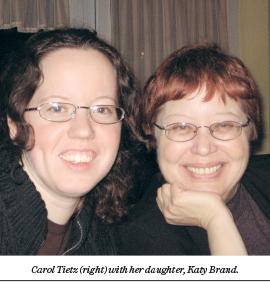Since my small cell lung cancer diagnosis in 2010, I’ve had to overcome not just the distress of having a life-threatening disease, but the stigma attached to it as well. I admit that I was a smoker. I was attracted to smoking when I was 16 and saw how “cool” people looked smoking in television and magazine ads, and I wanted to be just like them. By the time I was an adult and knew the dangers of smoking, it was too late; I was hooked. So, when I learned I had small cell lung cancer, my first reaction was to cry. My second reaction was to throw away my cigarettes. By the second day of my diagnosis, I was finished with both crying and smoking and was determined to get through my treatment and, hopefully, to a cure.

The treatment was brutal but worth it. I had 18 rounds of chemotherapy, which included etoposide and cisplatin, 33 rounds of radiation therapy, and 15 rounds of prophylactic cranial irradiation. At the end of the therapy, I was declared cancer-free, and I’ve remained cancer-free for 11 years. I have not wasted those years nor taken them for granted.
Defining Moment
When I was first diagnosed, I had to get a blood test at a hospital that was next door to a Ronald McDonald House. Seeing young children and their families affected by cancer jolted me to the reality of the devastation caused by this disease and how it can upend people’s lives for months and years, perhaps leaving a lasting impact from which they may never fully recover. It was especially sad for me to see these young patients who had done nothing to cause their cancer. I made decisions in my life that led me to the predicament I was in, but they were innocent.
I remember thinking at that moment, I’m 62 and have had a great life. I have a wonderful husband and daughter. If I have to die now, it’s okay. There was no sense wallowing in sadness and regret over having smoked for nearly 5 decades. If I lived, I promised myself that I would dedicate my life to helping others with small cell lung cancer, a disease that comprises about 13% of lung cancers—85% are non–small cell lung cancer—and has a dismal 5-year-survival rate of just 7%.1
Giving Back
My cancer diagnosis forced me to confront the fragility of life and catapulted me to a new vocation: patient advocacy. I became a volunteer with the GO2 Foundation for Lung Cancer (go2foundation.org) and joined its Phone Buddy program to help others with small cell lung cancer retain a sense of hope. I also talk to survivors about the importance of being informed patients to ensure they get the best care.
“My cancer diagnosis forced me to confront the fragility of life and catapulted me to a new vocation: patient advocacy.”— Carol Tietz
Tweet this quote
I’ve also traveled to Washington, DC, for Advocacy Day on Capitol Hill to share our stories and raise awareness about small cell lung cancer. We advocates have urged Congress to increase research funding for a cancer that combined with non–small lung cancer results in about 132,000 deaths in the United States each year2 and to ensure that everyone has access to affordable and adequate health care.
The work has been rewarding, and I’m grateful for the opportunity to give back to a community that I credit with saving my life. Despite all I have been through, I can say, unequivocally, my life has been blessed. I have no regrets.
REFERENCES
1. Cancer.Net: Lung Cancer—Small Cell Statistics. Available at www.cancer.net/cancer-types/lung-cancer-small-cell/statistics. Accessed September 17, 2021.
2. American Cancer Society: Key Statistics for Lung Cancer. Available at www.cancer.org/cancer/lung-cancer/about/key-statistics.html. Accessed September 17, 2021.
Ms. Tietz lives in Tinley Park, Illinois.
Editor’s Note: Columns in the Patient’s Corner are based solely on information The ASCO Post received from patients and should be considered anecdotal.

